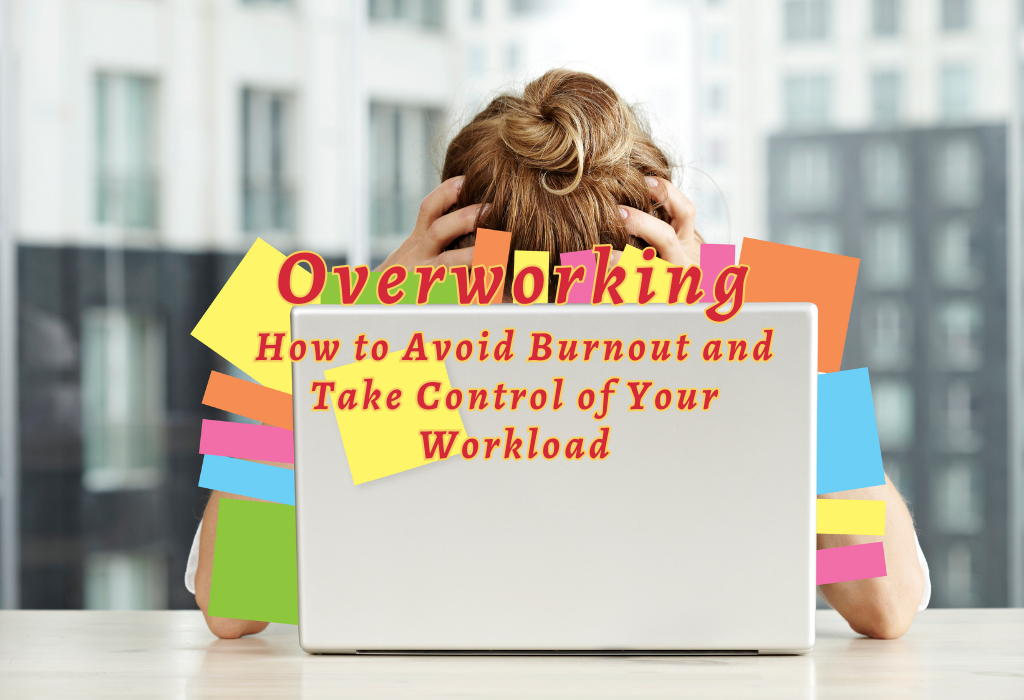Overworking: How to Avoid Burnout and Take Control of Your Workload
Sure, hard work can be the key to success. But how much is too much? Working too much, or “overworking,” can severely affect our physical and mental well-being, leading to burnout, stress, and fatigue. We need to recognize the danger of overworking and take proactive steps to avoid it – the ability to manage our workload, get adequate rest, and keep our work-life balance in check.
This blog post is here to help explore the perils of “overworking” while providing tips and advice on recognizing and avoiding it so you can stay healthy and productive at work. We’ll cover topics ranging from setting boundaries, managing stress, and handling a busy workload to taking breaks and prioritizing your tasks more effectively.
In short, it’s time to ensure you take control of your work-life balance and avoid overworking. So, let’s get started!

Quick Summary of Key Question
Overworking can lead to severe fatigue, irritability, difficulty concentrating, and decreased productivity. If these symptoms persist over time, it can significantly increase your risk for physical and mental health issues like depression, anxiety, and heart disease.
What is Overworking?
Overworking is a term used to describe engaging in too much work, usually of a stressful or demanding nature. It can be related to one’s profession, such as working excessively long hours or taking on too many projects at once, or it can also refer to overworking oneself more generally, such as in multiple areas of life. It often results in negative physical and mental consequences, decreased productivity, and poor work quality.
Some people see the benefits of overworking – the ability to work hard and accomplish a lot. This perspective is prevalent when society values productivity and hard work highly. They may argue that individuals who take on challenging tasks, long hours, or complex problems do their duties or strive to go above and beyond.
Conversely, others point out the drawbacks of overworking – namely. It puts people under chronic stress and fatigue that diminishes their performance instead of enhancing it. Studies indicate that working too many hours can hurt well-being, impacting both cognitive abilities and physical health. Allowing for sufficient rest and recovery can also lead to burnout over time.
The following section will explore these indications and how they manifest in different areas of life.
Signs and Symptoms of Overworking
Recognizing the signs of overwork is critical to managing stress and avoiding burnout. Common signs and symptoms include:
What happens when you do a lot of overwork?
On the one hand, there is an argument that if you push yourself to the point of exhaustion, you are setting yourself up for long-term consequences such as burnout or depression. Some people argue that working hard is all part of life and that pushing ourselves out of our comfort zone and into unfamiliar territory will move us ahead.
No matter which side you choose to sympathize with, monitoring your workload and knowing when your body is telling you that it’s time to slow down is essential. Everyone deserves some rest to return to their job or studies refreshed and energized. Taking advantage of days off or vacation time is necessary for maintaining a proper balance between work and leisure.
Leading into the next section about “Causes of Overworking,” understanding what makes us overwhelmed by our workload is just as important as recognizing the signs and symptoms. Knowing what lies behind our tendency towards overworking will help us tackle the root cause and create more productive working habits.
Causes of Overworking
Overworking is a problem that plagues employees in many companies and different industries. Several factors, including work expectations, workplace culture, job security, and productivity standards, can cause it.
1. Work Expectations
Many organizations have specific goals or objectives that they want their employees to achieve. If these goals are too ambitious or unrealistic for the amount of time given, employees may push themselves to work longer hours to succeed. It could lead to an overworking situation, where the employee is trying to do more work than can be done in the time allotted.
2. Workplace Culture
Another reason for overworking may be due to the workplace culture itself. In some organizations, there is an atmosphere that encourages long hours and hard work to demonstrate commitment and loyalty. There may also be pressure from senior management and peers if someone is seen taking breaks or leaving early – this could lead to staff feeling they need to stay late or sacrifice their own time to protect their position in the company.
3. Job Security
A third cause of overworking is related to job security. During tough economic times or layoffs, employees may fear for their job and decide to put in extra work hours to secure their position with the organization. They may think that working harder and longer makes them more likely to be seen as valuable by the employer and less likely to be let go during downsizing measures.
4. Productivity Standards
Finally, overworking can also be caused by productivity standards set by employers. When an individual has been assigned a specific output target or quota, they may need to continually increase their performance to reach those goals or maintain their position at the organization. It could cause them to become overwhelmed by their workload and put unnecessary stress on themselves by staying at work late or putting off holidays or personal projects.
Overall, when it comes to overworking, many causes can contribute to this phenomenon – from unrealistic expectations or strict productivity standards imposed by employers to more significant shifts in workplace culture that value long hours over balance or rest. Understanding the underlying causes behind this issue is essential to create solutions that promote healthier working environments for all employees tackling heavy workloads.
Exploring how these extreme working habits can impact mental and physical well-being is necessary.
Effects of Overworking on Mental and Physical Wellbeing
Overworking can have severe effects on mental and physical well-being.
1. Affected Mental Health
It’s been proven that too much work affects an individual’s happiness and can lead to burnout and a lack of productivity.
2. Psychological Changes
Prolonged stress generated from overworking can cause physiological changes in the body, such as increased blood pressure, chronic fatigue, and heart rate variability. It could lead to more severe health conditions such as high blood pressure or other cardiovascular diseases.
3. Depression
While pushing employees to their limits is often seen as a way to increase productivity, this unhealthy habit can also lead to short-term depression due to the inability to juggle multiple tasks and personal responsibilities.
It is essential for both employers and employees alike to take precautions and recognize when the workload becomes too much. Ignoring these warning signs can have lasting health implications for mental and physical well-being beyond the job itself. To prevent overworking-related ailments, individuals should take regular breaks throughout the day – even if it’s just for five minutes – to recharge their batteries and stay productive.
This section has discussed potential effects on mental and physical well-being. The following section will explore performance and productivity in demanding workloads.
Top Highlights
Working too much can severely affect our physical and mental health, leading to burnout, depression, poor performance, and potential cardiovascular diseases. Studies suggest moderate working hours with breaks can increase productivity, whereas excessive overworking gets avoided. It is, therefore, important for employers and employees alike to be mindful of the workload and take regular intervals to stay healthy.
How Overworking affects Performance and Productivity?
When it comes to performance, research has found that overworking can often negatively impact productivity. Recent studies suggest that working more than 50 hours per week can put undue stress on employees, decreasing performance quality, results, or output. If employees find themselves overworking regularly, they could risk their physical and mental well-being while potentially producing subpar work.
Hampered Productivity
Excessive working hours often impair the amount of creativity that goes into the job at hand. Working too long without taking breaks or rest often leads to decreased cognitive functioning and diminished motivation for completing tasks. Extended hours may not ultimately facilitate the most effective or efficient outcomes from employees and could contribute to poorer work overall.
Steps to overcome side effects of overworking
The following steps must get considered to sustain your performance and productivity:
Overall, employees of any stripe need to avoid overwork as an indicator of successful performance or productivity to ensure that they remain energized while engaging constructively with work-related duties. With this in mind, let’s move forward and explore how fatigue and exhaustion can compound overwork-sourced issues.
Why do we face Fatigue and Exhaustion?
Fatigue and exhaustion are two prevalent symptoms that can occur when people ignore the warning signs of overworking. Understanding what causes this feeling of extreme tiredness and how to combat it is essential.
Reasons
Fatigue and exhaustion are caused when:
Stressful situations in daily life can also result in physical exhaustion, while excessive worrying can sap mental energies.
Steps to overcome
Recognizing the physical and mental signals that may indicate you’re overworked is essential. These include difficulty concentrating, headaches, irritability, and muscle tension. The sooner these signs are acknowledged, the more likely it will be that fatigue and exhaustion get avoided.
There are several things that those suffering from overwork-related exhaustion can do to protect themselves against developing more severe physical problems such as:
It is also recommended for those who suffer from work-related fatigue and exhaustion to assess their workloads on a regular basis. It can help people identify the activities or tasks that lead them to become burned out or overly stressed out so they can actively adjust those components of their lives accordingly.
Balancing work and life – how to avoid overworking – is the next step in addressing issues related to overwork and avoiding burnout.
Balancing Work and Life – How to Avoid Overworking
When striving for success, finding a balance between work and life is essential. Allocating a certain amount of time for work can be beneficial to stay motivated, productive, and successful. However, there can be an underlying risk if this much time results in overworking.
1. Setting Priorities
Finding the balance between giving your best effort and allowing yourself enough time away from your job or career to recharge and refresh is essential. Prioritizing what tasks you should focus on during work hours is necessary to ensure that these tasks are completed with high quality within appropriate deadlines. It will free up extra time dedicated to leisure activities outside work. Additionally, building a support system such as family and friends can help ensure that other areas of life do not suffer in favor of career aspirations or goals.
2. Taking Time Off and Breaks
It’s essential for an employee’s physical, mental, and emotional well-being to take regular breaks and time off from work. Taking time away from work can provide the opportunity to reset, recharge, and refocus while alleviating stress and fatigue from overworking. It’s essential to understand the importance of taking extended periods off. Research indicates that vacations can be beneficial for individuals in terms of reducing stress hormones, improving sleep habits and job performance, and even reducing cardiovascular risks associated with overworking (e.g., heart disease).
3. Prior Planning
It is essential to plan when taking more extended periods of leave. Employers should offer resources to staff such as task delegation options, project planning support systems, and a session with a therapist or life coach if necessary. These principles are also applicable for shorter breaks such as daily lunch periods and coffee breaks throughout the day. Employees should try their best not to check emails or become available on their phones during such holidays; this promotes distraction-free ‘mini’ vacations which can help lower levels of stress and increase productivity for the remainder of the day.
By following good time management techniques when scheduling routine breaks throughout the day/week/year and adequately preparing for more extended periods of leave, employees can remain productive and avoid burnout caused by an overload of stress. Lets discuss how employers can recognize signs in employees struggling with workaholism to provide proper treatment for these individuals.
How to Recognize and Treat Workaholism
Let’s delve into this topic to debunk all the tips and tricks;
What is workaholism?
Workaholism is a type of addiction involving working too many hours that interferes with the individual’s daily life and functioning. It can be challenging to discern workaholic behavior, as it may be accepted and even praised or admired socially. For instance, people who are seen to put in long hours, dedicate themselves fully to their work, and prioritize their careers may be vaunted for their dedication and commitment. Despite this, if taken too far, such behavior can significantly impact an individual’s mental health and well-being.
Signs of Workaholism
Individuals who struggle with workaholism will often have difficulty managing their workload, experiencing high levels of anxiety and stress when expectations are not met or when deadlines are not achieved. Generally speaking, a person who is struggling with work-related addiction will:
If any of these signs apply to an individual, they may display workaholism symptoms. However, it is important to emphasize that some characteristics get observed in individuals who are strongly dedicated to their profession; further assessment is conducted before definitively labeling someone as a “workaholic.”
Treating Workaholism
Psychotherapy is the best way to treat someone displaying signs of being a workaholic.
Cognitive Behavioural Therapy
Cognitive Behavioral Therapy (CBT) has been proven effective for treating various behavioral addictions, including workaholism. In therapy, individuals can explore why they have become addicted to their profession (this could reveal underlying themes such as traumatic events from childhood or recent years). Additionally, therapy can help individuals learn how to exercise greater control over their workload while limiting their feeling of obligation toward their job duties. People with an excessive commitment to work can also gain insight into setting boundaries and prioritizing hobbies or activities outside of work that could help them manage stress levels more effectively.
Though the values espoused by the so-called “work hard/play hard” culture can give people purpose and make them feel invaluable in the workforce, they must maintain a balance between their professional goals and enjoyment outside the office. Ultimately, recognizing and acknowledging warning signs early on is essential for preventing severe damage from sustained periods of overworking. By making changes early enough in the process, burnout from heavy workloads can be avoided or minimized significantly.






